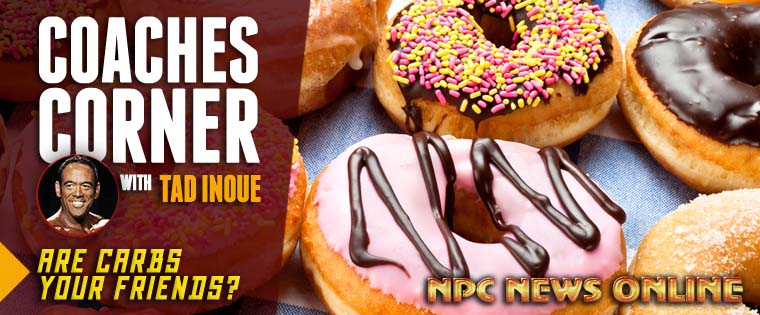Carbs are a hot topic these days. Everyone seems to treat carbs as the enemy, but are they really? Ever since the Atkins Diet hit the scene many years ago most people seem to understand the concept that too much insulin and unused glucose floating around in your body will eventually mean fat storage. The key words here are “unused glucose” or unused carbs.
Your body works with a very limited fuel tank that has about a two to three hour time limit for nutrients to be used in the blood stream. So naturally your body wants fuel sources every 2-3 hours. If it doesn’t get fuel regularly then it can tap into fuel reserves, sometimes this can be good when the fuel reserves are fat, but in many cases it is bad because the reserves it taps into are often hard earned muscle tissue. It may also slow down its energy need during longer, low blood sugar periods if energy isn’t provided. This metabolic slow down is the way your body adapts to what you’re feeding it.
Energy balance in your body is maintained through a series of hormonal reactions. The most important reaction that everyone hears so much about is insulin. Insulin is a storage hormone that most of us produce and whose main job is to shuttle nutrients into cells. Sometimes in instances where there are lots of glucose or fats hitting the bloodstream, the body can produce higher amounts of insulin and this usually means that your body is now pushing those nutrients into the fat cells for storage. This is the focal point of most of the low-carb diet fad diets. Get insulin levels down by eliminating carbs from your diet and you will force your body to burn other fuels. The problem with low-carb diets are: it is almost impossible to make development improvements on your physique, it slows your metabolism down drastically, creates sugar sensitivities that can lead to binge eating, mood swings, lethargy, muscle wasting, strength decreases, sleep issues, constipation, need I say more?
So does all this insulin production and fat storage happen every time you eat carbs? Yes, it does and No it doesn’t. Your body needs a way to handle sugar, fats, and proteins. Insulin is a very needed and helpful hormone and without it we can die. So how can you eat carbs without making your body over produce insulin and store fat like a bear about to go into hibernation?
The secret is to just give your body what it needs when it needs it. This is the method of eating small portions every couple of hours. Depending on your activity level and your own unique metabolism, the level of carbs per meal will vary.
You also must consider the source of the carbs. If the carbs you put into your body are fast acting and release into your blood stream quickly, like things with sugar and processed corn products in them, then this can often fool your body into thinking that
Tad the Diet Coach
there will be a lot more sugar (or carbs) coming, so more insulin is then delivered. This reaction makes most people hungrier. Additionally, it causes the body to store fat from all the excess insulin pushing glucose into tissues. So what carb sources won’t do this?
Good, slower acting sources are things like beans (yes, they are a starch), some vegetables, whole grain pasta, potatoes, yams, brown rice, and quinoa. Fruit is also a good carb source that doesn’t impact insulin levels very much, but fructose, the sugar in fruit, isn’t as effective at loading into the muscle so be sparing with the fruit if you’re fueling a workout or exercise regimen.
Remember, I said earlier that “unused glucose,” or unused carbs, was key. Sources that load into the blood stream too fast often cause insulin levels to rise quickly. This is bad. However, some of the good sources empty into the blood stream much slower and at a more consistent rate, allowing the body to handle the glucose with minimal insulin. So you encourage better energy balance when you eat these slower acting carbs and discourage fat storage at the same time. But remember “unused” is still our key word, which means portion sizes are everything. You must only put in the carbs that are required to hold energy balance for the next 2-3 hours. This can be difficult because many carb sources can be too dense in calories which makes it very easy to over eat these carb sources.
Carbs aren’t the enemy, but too many carbs can certainly be bad. The enemy is a poorly planed eating lifestyle that doesn’t include complex-slow releasing carbs in your day and portion sizes that have too many carbs in them. Focus on eating for your energy needs over the next 2-3 hours and feed yourself accordingly. Actually, carbs are your friends! But just like your mother told you as a child, choose your friends wisely.
 Tad Inoue (A.K.A. “Tad the Diet Coach”) is a leading diet coach and nutritionist in the figure, bodybuilding and bikini competition industry. He has worked with hundreds of clients from all over the United States and other English speaking countries for over 15 years creating nutritional plans for competition, health and fat loss. You can find him on the web at www.TadTheDietCoach.com or tad@tadthedietcoach.com.
Tad Inoue (A.K.A. “Tad the Diet Coach”) is a leading diet coach and nutritionist in the figure, bodybuilding and bikini competition industry. He has worked with hundreds of clients from all over the United States and other English speaking countries for over 15 years creating nutritional plans for competition, health and fat loss. You can find him on the web at www.TadTheDietCoach.com or tad@tadthedietcoach.com.





